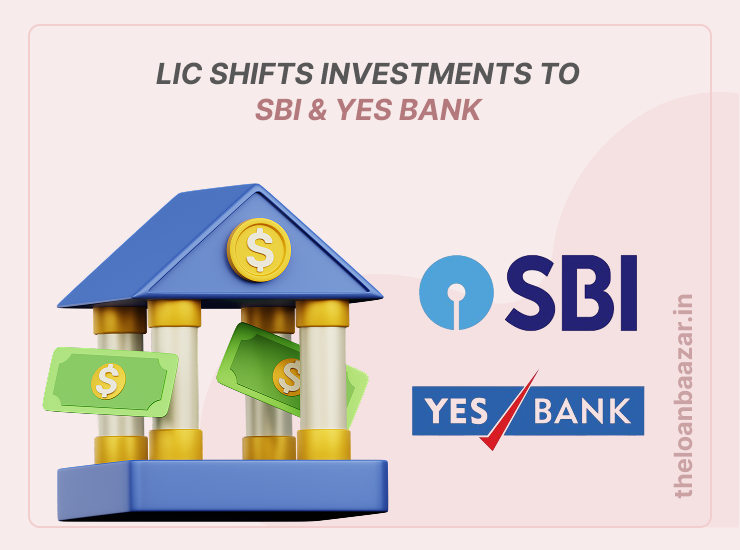LIC’s Bold Portfolio Shift: Betting Big on PSU Banks in 2025
India’s largest insurer, Life Insurance Corporation of India (LIC), has surprised the financial world by reducing its stakes in top private banks like HDFC Bank, ICICI Bank, and Kotak Mahindra Bank, while significantly boosting its investments in State Bank of India (SBI) and Yes Bank.
This move marks a significant strategic realignment in LIC’s investment philosophy—reflecting growing confidence in the public sector banking ecosystem amid India’s evolving financial landscape.
The Big Numbers: Where LIC Moved Its Money
In Q3 2025, LIC:
-
Sold ₹3,203 crore worth of HDFC Bank shares
-
Sold ₹2,461 crore of ICICI Bank holdings
-
Sold ₹2,032 crore in Kotak Mahindra Bank
-
Added 6.41 crore shares in SBI, worth ₹5,285 crore
-
Quadrupled its stake in Yes Bank, from under 1% to nearly 4%
This massive portfolio adjustment shows that LIC is shifting from private banking giants to public sector leaders—a move that contrasts sharply with the trends of foreign investors who continue to prefer private banks.
Why LIC Is Bullish on PSU Banks
According to market analysts, PSU banks are experiencing a renaissance:
-
Attractive valuations: Even after strong rallies, PSU banks remain cheaper compared to private peers.
-
Improved profitability: Most PSU banks have reported consistent profits over the past few quarters.
-
Government reforms: Ongoing consolidation and digital transformation have made public banks more efficient.
“The PSU banking space is resilient and attractively valued,” notes VK Vijayakumar of Geojit. “With the merger of PSU banks, their future looks promising.”
Contrasting Global Sentiment
Interestingly, while LIC is moving toward PSU banks, foreign investors are going the opposite way.
-
Emirates NBD invested $3 billion for a 60% stake in RBL Bank.
-
Sumitomo Mitsui raised its Yes Bank stake to 24.2%.
-
Blackstone purchased nearly 10% of Federal Bank for ₹6,196 crore.
This divergence suggests LIC’s move is not just reactive—it’s a contrarian bet on long-term value.
The Strategic Logic Behind LIC’s Move
-
Value Investing Approach: LIC often targets undervalued or oversold stocks with strong fundamentals.
-
Government Support: Public sector banks benefit from policy stability and recapitalization initiatives.
-
Market Correction Opportunity: The private banking sector’s high valuations made them less attractive for fresh investments.
-
Risk Management: PSU banks are perceived as safer during market uncertainty.
This reflects LIC’s counter-cyclical strategy—buying when others are cautious and selling when valuations peak.
Market Impact & Investor Takeaways
-
The shift could reshape institutional flows in the banking sector.
-
Investors may see renewed confidence in PSU bank stocks.
-
LIC’s move might pressure private bank valuations in the short term.
-
Long-term investors should watch how interest rate cuts and credit demand impact both sectors.
What It Means for You
If you’re an investor or work in financial advisory:
Keep an eye on SBI and Yes Bank performance in upcoming quarters.
Consider PSU banking ETFs or mutual funds for potential medium-term gains.
Track LIC’s quarterly filings—they often hint at broader market sentiment.
1. Why did LIC reduce its stake in private banks?
LIC aims to rebalance its portfolio, taking profits from high-valued private banks and redeploying capital into undervalued PSU banks.
2. Why invest heavily in SBI and Yes Bank?
SBI offers strong fundamentals and leadership in PSU banking, while Yes Bank presents a recovery story with long-term upside potential.
3. How will this affect retail investors?
This move may drive renewed interest in PSU stocks, potentially boosting their prices. Retail investors can consider well-managed PSU funds.
4. Is this a short-term or long-term strategy?
LIC’s investment style suggests a long-term value approach, focusing on stability and growth potential over several quarters.
5. What does it indicate about India’s banking future?
The shift hints at a rebalancing of confidence—from private dominance to a more balanced landscape where PSU banks reclaim relevance.
Final Thoughts
LIC’s latest move isn’t just about numbers—it’s a strategic signal.
By betting on SBI and Yes Bank, India’s largest institutional investor is expressing faith in the resilience of the public banking system.
For investors, the message is clear: the PSU banking story is far from over—and LIC just gave it a fresh chapter in 2025.











